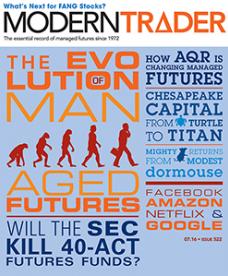Category: News & Research
dormouse will be represented at Context New York 2017, being held on April 20. Contact us if you are interested in meeting but unable to find a slot that works or are not attending Context, and we may be able to arrange an off-site visit.
dormouse will be represented at MFA (Network 2017) and Context Miami the last week of January. We'd love to meet and tell you about our program. Slots are nearly all spoken for, but we can also accommodate meetings at the Brickell office of our Miami-based research affiliate, dormouse Nest LP, if we are unable to meet at one of these events. Or just stop by our booth to introduce yourself or say hi.
dormouse is pleased to announce the opening of the dormouse Fund, a Cayman vehicle that invests in the same dormouse program as our managed accounts. Class "A" shares offer 1/20 fees and a low $1M minimum. For a limited time, we are offering class "B" shares with a lower 1/10 fee structure and a $10M minimum investment. Both share classes offer monthly liquidity. The fund will receive the same trading signals as the dormouse-program managed accounts.
dormouse was featured in the June 2016 issue of Futures Magazine's Modern Trader.
dormouse Limited is pleased to announce that an affiliate, dormouse Nest LP, has opened in Miami, USA to assist in research and marketing. Head of research and former portfolio manager Dr. Eric Westphal is heading this office. If you are visiting Miami and would like to learn about our programs, please contact us to arrange a meeting. dormouse Nest staff also make regular visits to major US cities; contact us if you would like to arrange a meeting at your offices.
By Martin Coward
Human beings delight in expending effort on pointless endeavors, but nowhere do we find more fertile ground than in performance analysis. Financial columns, television and newsletters are filled with statistics and discussions: on market indexes, individual stock moves, individual manager records, active versus passive funds, equities versus bonds, big versus small, new versus old and so on. The amount of information is truly mind-numbing, and it has spawned a huge self-reinforcing industry of analysts. That’s all very creditable when job creation is at the top of the political and economic agenda, but does it really have any value other than that?
Computers are a tool to analyze data, and armed with this tool, explorers have boldly gone looking for data to analyze. Code breakers in World War II were early adopters; astronomers used the computer to make sense of data about quasars and black holes; physicists used it to create a whole new branch of mathematics (chaos theory); epidemiologists use it to model human health characteristics. While some might quibble about including the last field, which has some similarities with finance, the new tool has been extremely effective, and we have been able to find new phenomena and new models out of the masses of data.
It is easy to be seduced by the successes computers have had in other fields into believing that they will be effective everywhere. In finance they do of course have a domain of applicability, but this domain is only a small part of the total.
Financial data is generated by the interactions of billions of people, not by fundamental physical processes. There are no underlying models that conveniently describe the evolution of financial prices; the best we can hope for is to catch inaccurate, fleeting glimpses of predictability caused by the aggregate impact of all those decision makers. To make things worse, the environment is changing all the time. The past 100 years have seen huge change: widespread adoption of the telephone, the rise of the middle class, vast increases in taxes, modern portfolio theory, novel financial instruments, floating currencies, computers and the Internet, electronic exchanges, to pick just a few. Oh, and a nearly fourfold increase in population.
Some things are easier to predict than others. Bonds (used to) have a more or less certain payoff, so are suited to mathematical modeling; indexes represent an aggregation of many effects whereby some of the uncertainties cancel out. Large corporations employ thousands of people over long periods in hopefully sustainable businesses with transparent accounting practices, where forecasts can be attempted. However, even in these areas we are all aware that predictability, if any, is very small. What are the characteristics of hedge funds? Typically, they have been around just a few years, they employ 30 people, and their portfolios are not transparent. Their investment processes change rapidly, as does the environment they are competing in.
This doesn’t mean that hedge funds are poor investments; in fact, the good ones are excellent investments. But using performance measurement and analysis to sort the good ones from the rest is as futile an endeavor as it’s possible to imagine. Even worse, it’s a substitute for thinking, and it leads to the sort of allocation mistakes that will be fresh enough in the reader’s mind as not to need mentioning here. Far from being indicative of future results, past performance brings in too much money, into the fund and into competing funds; encourages strategy creep; reduces incentives to perform; and in summary, creates a different environment from the one that generated the performance. And here I am talking only about returns, let alone other targets of the computer-assisted analyst: correlation with other funds, stability over time, the probability of extraordinary profits and losses.
It is hard to make money. It has to be because making money is about being successful relative to everyone else, and that’s just not possible for everyone. It follows necessarily that financial markets must be almost unpredictable. Even more than this simple argument, bitter experience should have been enough for most of us. But we inhabit a world where there are thousands of funds to choose from, where investment decisions have to be taken, and where those decisions have to be seen to be justifiable against an ever-weightier backdrop of oversight and regulation. Despite previous disappointments, it’s all too easy to fall back on the crutch of performance analysis, which is cheap, quick, objective, repeatable, easily justified — and to hope that this time will be different. AR
Martin Coward is the founder of Dormouse, a systematic trading fund launching later this year, and the co-founder of IKOS.




